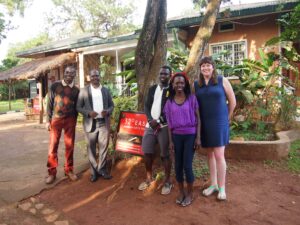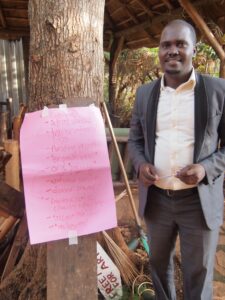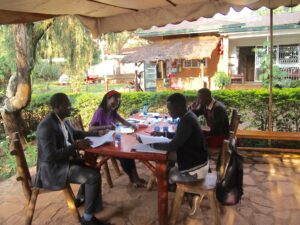Engaged Anthropology Grant: Erin Moore

While a doctoral student at the University of Chicago Erin Moore received a Dissertation Fieldwork Grant in 2012 to aid research on “Women into Girls? Translating & Transforming Development in Ugandan ‘Girls’ Empowerment Programs,” supervised by Dr. Jennifer Cole. In 2016 Dr. Moore went on to receive an Engaged Anthropology Grant to aid engaged activities on “Race, Gender, and Geopolitics in Uganda’s NGO Economy: A Consortium”.
In Uganda, more than 15% of the national budget is controlled by foreign development agencies and multinational NGOs. In the wake of state retrenchment, Ugandans look to NGOs for employment, education, and other social and health services. Moreover, the international development industry drives both curricula and research in universities, as funds for tertiary education have been entirely privatized in recent decades. This national context – what I describe as Uganda’s “NGO economy” – hinges upon partnerships between western development agencies and local institutions.

These partnerships are asymmetrical: because Ugandans depend on development partnerships for income, they must work assiduously to maintain them. As I found over the course of my dissertation fieldwork in both activist and academic settings, this foreign-local partnership model explicitly shaped particular research objectives and precluded others. For example, at a 2012 meeting hosted by a Makerere University professor and her colleague from DFID, the UK’s state development agency, DFID’s desire to understand “cultural” obstacles to girls’ schooling foreclosed a prominent legal scholar’s proposed investigation into young women’s strategies for resilience.
Ugandan scholars and NGO practitioners often remark upon these experiences as structural inequalities systemic to an industry that they nonetheless rely upon for their livelihoods. Similar private conversations with Ugandan interlocutors over the course of my fieldwork suggested a need for a scholarly space outside the auspices of the development industry to critically assess the structural inequalities of Uganda’s NGO economy. To create such a space, with support from the Wenner-Gren Foundation for Anthropological Research’s Engaged Anthropology Grant, and together with six artists, scholars, and activists the Kampala Critical Development Collective (KCDC) held its inaugural meeting in February 2017.
Hosted by the Kampala arts center, 32 Degrees East, KCDC met for an ethnographic writing workshop. Before the workshop, pariticipants posted relevant articles from academics and journalists in critical development studies to a shared database and circulated short autoethnographic pieces reflecting on the intersections of economic injustice and gender, generation, and geopolitics in the NGO industry.

The workshop opened with a discussion of the history of anthropology and its relationship to colonialism and the international development industry in Uganda. We then turned to ethnography and autoethnography as methods for relating one’s personal experiences to broader structures of inequality. For many, autoethnography was a new (and fruitful) writing genre, one that the group found useful for drawing connections across individual experiences.
From these methodological convervations, we turned to workshopping each participant’s pre-circulated autoethnographic piece. One KCDC member working for a major multinational children’s rights NGO described the irony of sending NGO beneficiaries, school-aged young people, to donor events in the Unites States and Europe while refusing to distribute monies for school fees to these same nominal beneficiaries. One prominent popular author involved in literacy activism wrote about the contingencies of accepting international donor funds, which demand accountability in the number of physical books distrubted to rural schools but whose metrics cannot capture the cultivationg of a “reading culture” among young people. A feminist activist involved in Uganda’s preeminent women’s movement lamented the impossibilities for the intergenerational transmission of feminist thought between older and younger women given the costs of attending both national and international feminst consortia. Over the course of reviewing each other’s writing, KCDC together discussed shared experiences of socioeconomic injustice across an industry that has become a primary source of employment for middle class young people in Uganda.
In June 2018, KCDC will meet for its second collaborative writing workshop to further develop these initial pieces for publication and to grow the collective’s reach. Additionally, KCDC is developing a collaborative blog as well as capacity for montly networking meetings to gather more Kampala-based scholars, activists, and artists interested in purusing projects related to critical development studies.